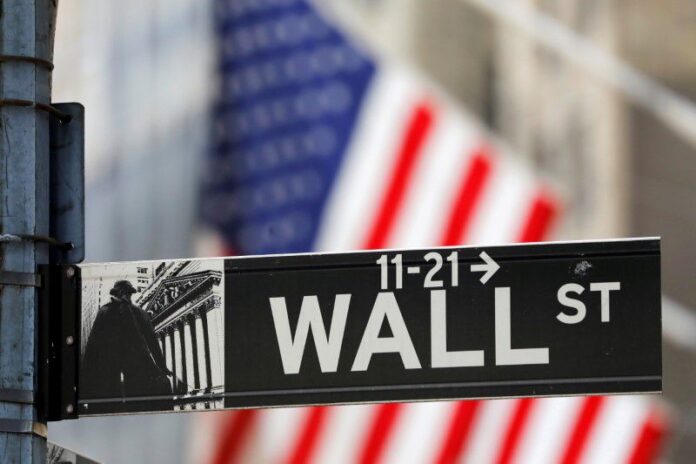
Stocks fluctuated as traders braced for earnings from several technology bellwethers amid the threats of a hawkish Federal Reserve, scorching inflation and a looming economic recession.
The S&P 500 was little changed after last week’s rally. Energy and financial shares advanced, while the tech-heavy Nasdaq 100 underperformed, with giants like Apple Inc. and Google’s parent Alphabet Inc. set to report results this week. Treasury 10-year yields climbed back above 2.8%, following a two-day plunge of almost 30 basis points.
After raising rates in June by the most since 1994, Fed Chairman Jerome Powell and his colleagues are expected to approve another 75-basis-point hike Wednesday and signal their intention to keep moving higher in the months ahead. The economy is already feeling the pinch from the repeated rate increases, with the housing market softening, unemployment claims edging up and technology companies curbing hiring.
Growth is sputtering across the tech world, with investors bracing for mostly bad news from the megacaps. Amazon.com Inc.’s revenue is expected to grow at its slowest rate in decades. Chipmakers are lurching from boom times to a potential glut. Gig-economy companies such as Uber Technologies Inc. and DoorDash Inc. could be victims of consumer budget cutting. And there’s the pullback in online advertising, which is poised to weigh on results from Facebook owner Meta Platforms Inc.
The question for traders is how much of the slowdown is already reflected in stock prices. For Nicholas Colas, co-founder of DataTrek Research, this week will be something of a “make-or-break” period for investors’ confidence in the power of Corporate America.
“For the recent rally to continue, markets need to feel that monetary policy and corporate earnings power are incrementally more predictable than six weeks ago,” Colas wrote in a note to clients. “Our bias is to lighten up here, but even long-term investors should understand that this week is critical to market psychology.”
Goldman Sachs Group Inc.’s David Kostin sees revenues under pressure of a stronger dollar, while Bank of America Corp. strategists note that corporate sentiment during earnings calls is deep in recession territory Meantime, Citigroup Inc. and UBS Global Wealth Management strategists say the earnings season is turning out to be better than feared as consumer spending remains resilient, while stocks have already priced in much of the bad news.
Investors are skeptical that the Fed can tame the worst inflation in four decades without driving the economy into a recession. Over 60% of 1,343 respondents in the latest MLIV Pulse survey said there’s a low or zero probability that the US central bank can rein in consumer-price pressures without causing an economic contraction.
A hallmark of recession is a drop in investment, often driven by a slowdown in inventory building or outright destocking. Inventories and durable goods orders — due Wednesday — will help clarify whether a recession is at hand, according to Anna Wong, chief U.S. economist for Bloomberg Economics. She estimates that both have weighed on second-quarter gross domestic product. The Fed’s preferred inflation gauge — PCE deflator — comes out Friday.
“Naturally, during times of market stress, every week seems pivotal,” wrote Strategas’ Jason De Sena Trennert and Ryan Grabinski. “Still, the next five days will be chock-a-block with earnings, economic releases, and economic events that are likely to set the tone for the market.”
The strategists added that they are still cautious as “earnings estimates have not yet begun to discount what would seem to be some obvious pressures on profit margins.”
For Ed Yardeni, president of Yardeni Research, the S&P 500 will continue trading range-bound until better economic growth boosts forward S&P 500 earnings estimates, which could be a few months away.
In corporate news, Apple announced a rare retail promotion in China, offering four days of discounts on its top-tier iPhones and related accessories in advance of the launch of its next-generation devices. Intel Corp. has secured one of the biggest customers to date for its year-old contract chipmaking arm. Regulators are directing US operators of Boeing Co. 777 widebody jets to repair aircraft to address concerns about potential fuel-tank explosions, according to a filing Monday.
Here are some key events to watch this week:
- Alphabet, Apple, Amazon, Microsoft, Meta earnings due this week
- Bank of Japan releases minutes from its June meeting, Tuesday
- US new home sales, Conf. Board consumer confidence, Tuesday
- IMF’s world economic outlook update, Tuesday
- EU energy ministers emergency meeting, Tuesday
- Fed policy decision, briefing, Wednesday
- Australia CPI, Wednesday
- US GDP, Thursday
- Euro-area CPI, Friday
- US PCE deflator, personal income, University of Michigan consumer sentiment, Friday
Some of the main moves in markets:
Stocks
- The S&P 500 was little changed as of 1:38 p.m. New York time
- The Nasdaq 100 fell 0.6%
- The Dow Jones Industrial Average rose 0.1%
- The MSCI World index was little changed
Currencies
- The Bloomberg Dollar Spot Index fell 0.1%
- The euro was little changed at $1.0218
- The British pound rose 0.4% to $1.2048
- The Japanese yen fell 0.4% to 136.72 per dollar
Bonds
- The yield on 10-year Treasuries advanced seven basis points to 2.82%
- Germany’s 10-year yield declined one basis point to 1.02%
- Britain’s 10-year yield was little changed at 1.94%
Commodities
- West Texas Intermediate crude rose 1.9% to $96.47 a barrel
- Gold futures fell 0.5% to $1,736.60 an ounce

















